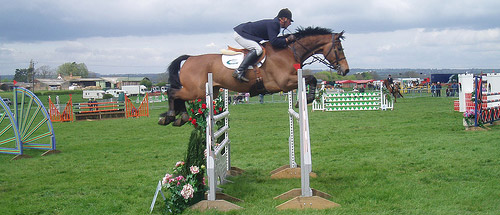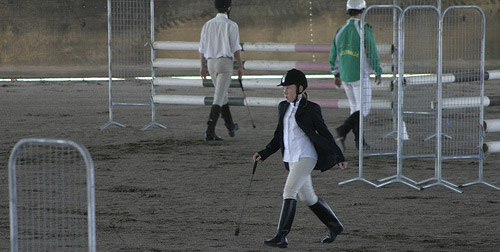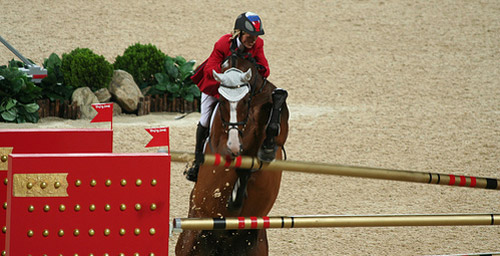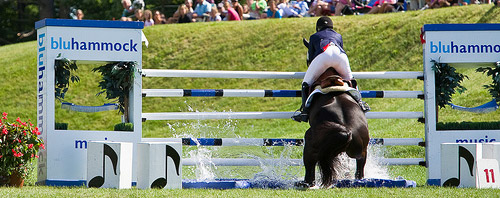Everyone can use a brush up on show ring lingo. Things are easier when you understand them, so learning a little of the terminology before stepping into the show ring can help you win points.
The Basics
Green
A young horse, green hunters are in their first or second year of showing.
Hand
Unit of measurement for a horse which is equivalent to 4 inches. Horse and pony measurement is taken in hands from the ground to the withers.
Stride
The amount of ground a horse covers in one canter step.


Image from Thowra_uk
Amateur
A rider who shows, but is not paid to ride.
Junior
A rider, either hunter or jumper that is under 18.
Professional
Riders who are paid to ride their mounts.
Jumps
Come in all shapes and sizes. Difficulty is determined by the construction, the materials and the size.
There are several types of jumps and each one has several components.
Verticals
Essentially these are vertical boards or poles.

Essentially these are vertical boards or poles.

Image from Andrew Pescod
Oxers
These are wide fences sometimes square and sometimes uneven.

These are wide fences sometimes square and sometimes uneven.

Image from Ned Trifle
Quarter and half rounds
Like their name they are rounded fences, either a quarter or a half dome.

Like their name they are rounded fences, either a quarter or a half dome.

Image from Andrew Pescod
Rails
Wooden poles used to create fences.
Wooden poles used to create fences.
Dressage
Part of the Olympic three, dressage tests the agility, flexibility and grace of a horse.
Cross Country
Part of the Olympic three, cross country tests endurance and speed.
Jumper Terminology
Jumper
Part of the Olympic three, jumpers are judged solely on athletic ability over fences. The horses can be any breed or color so long as they can get through a course without faults.
Part of the Olympic three, jumpers are judged solely on athletic ability over fences. The horses can be any breed or color so long as they can get through a course without faults.
Fault
A penalty incurred during a jumper class, includes downed rails, fence refusals or going over time limits.
A penalty incurred during a jumper class, includes downed rails, fence refusals or going over time limits.
Clear Round
When rideing a course against the clock, a clear round means there were no faults (downed rails or extra time) incurred.
When rideing a course against the clock, a clear round means there were no faults (downed rails or extra time) incurred.
Falling off or going off course is generally grounds for dismissal from the class.
Jump-Off
If more than one jumper achieves a clean round, a jump-off is held against the clock to determine the winner.
If more than one jumper achieves a clean round, a jump-off is held against the clock to determine the winner.
Open
An advanced division which does not restrict riders by their previous winnings.
An advanced division which does not restrict riders by their previous winnings.
Hunter Terminology
Hunter
Judged on style and ability. The fences used in hunter classes are more organic in form and generally smaller than fences used in jumper classes.
Judged on style and ability. The fences used in hunter classes are more organic in form and generally smaller than fences used in jumper classes.
Equitation Classes
Judge the ability of the rider not the horse. Riders will be evaluated on form and skill. Usually classified according to age and skill level.
Judge the ability of the rider not the horse. Riders will be evaluated on form and skill. Usually classified according to age and skill level.
Universal Show Lingo
Jumping Order
The order of the class is determined by a drawing before the class begins. Riders later in the class have the advantage of watching previous rounds before attempting their own.
The order of the class is determined by a drawing before the class begins. Riders later in the class have the advantage of watching previous rounds before attempting their own.
Round
The riders turn to jump a course.
The riders turn to jump a course.
Course
The prescribed order of the jumps in a specific class. Courses are posted in advance so the riders can learn them prior to riding their round.
The prescribed order of the jumps in a specific class. Courses are posted in advance so the riders can learn them prior to riding their round.
Walking the course
Riders are allowed to walk out the course route on foot to examine the fences and pace out strides between fences.

Riders are allowed to walk out the course route on foot to examine the fences and pace out strides between fences.

Image from Robert Whitehead
Combination
More than one jump in a row.
More than one jump in a row.
Off-course
If a hunter or jumper deviates from the prescribed course they are off-course.
If a hunter or jumper deviates from the prescribed course they are off-course.
Knockdown
If a horse (or rider) makes contact with a fence and subsequently a rail falls. This is only a knockdown if it lowers the height of a fence.

If a horse (or rider) makes contact with a fence and subsequently a rail falls. This is only a knockdown if it lowers the height of a fence.

Image from flying_tiger
Refusal
When a horse stops before (or avoids entirely) an obstacle.


Image from sskennel
American Horse Show Association
The National federation in charge of regulating competitions and judges.
The National federation in charge of regulating competitions and judges.
Start Practicing For the Ring
Now you are armed and ready to hit the show ring, all you need is hours of practice and a good horse.


No comments:
Post a Comment